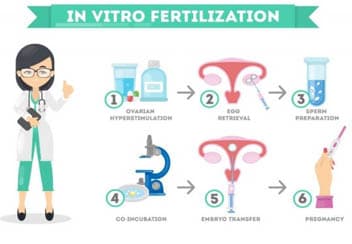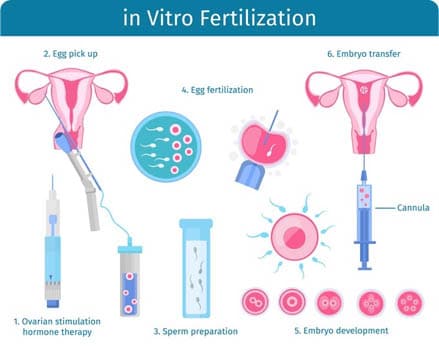Have you ever visited the best IVF Centre in India or anywhere else in the world? Or are you looking forward to checking-in anytime soon? Then there are a few things you need to be aware of.

In This Article
Choosing IVF Centre
Popular destination like Turkey, Spain, India etc. offer treatment at lower cost. India comparatively has costs much affordable. The quality of treatment is in par to other countries. Thus it has now become a popular destination for IVF treatment. Saraogi Hospital is one such leading IVF Centre in India, headed by Dr Mohit Saraogi (MD – Obstetrics & Gynaecology, FCPS – General Surgery, DGO, MRCOG (UK), MBBS, DM) has an expertise of 12 years. He being one of the best IVF doctor in India, has won numerous awards in his field and is well recognized. Being a Gold Medalist in his medical carrier he specializes in infertility treatments making his patient’s happy by offering them positive results with his treatments.
In this guide, we are going to discuss everything you need to know about IVF by answering some important questions. Continue reading.
What is IVF treatment?
Let begin by understanding what IVF is all about. This is a complex series of procedures performed on an individual with fertility problems. It can also help prevent genetic problems but mostly to assist families in having a child.
Instead of mature eggs being fertilized in the womb of a woman, they are done in the lab. The eggs and sperms are retrieved separately, fertilized then transferred to a uterus. Any woman can carry this embryo in her womb.
It is not an easy procedure and takes about three weeks for the full cycle to be complete. It may take longer, though, depending on how the steps are being done.
Why is IVF done?
The simplest answer would be, to help solve fertility problems. It is a very effective, productive technology that has been around for several years now.
If you are not able to conceive, for instance, your eggs can be collected and fertilized using your partner’s sperms. Or you may get eggs and sperms from donors. Then they are either transferred to your uterus or a volunteer to carry for you are pregnancy.
It is done to treat infertility. In some cases, it is a good option for women over 40 years old. It may also be done as a result of health problems like:
- Fallopian tube damage or blockage
- Ovulation disorders
- Uterine fibroids
- Previous tubal sterilization or removal
- Impaired sperm production or function
- Unexplained infertility
- A genetic disorder
- Fertility preservation for cancer or any other health condition.
What are the different types of IVF treatment?
Several methods are being used in IVF at the moment. They include :

In Vitro Fertilization (IVF). This is a procedure we already discussed above. The first baby was delivered in 1978 and named Louise Brown. Ever since millions of other babies have been successfully delivered.
Intracytoplasmic Sperm Injection (ICSI). Whereas the two methods above are used where a woman has the problem, ICSI is used in cases where the man has the problem. When he has a low sperm count or poor sperm mobility, this procedure can be an option. It involves a standard IVF procedure with approx 100,000 sperms that are injected in each egg (one sperm for one egg), hoping one may fertilize the egg overnight.
As mentioned already, IVF is a procedure that heals infertility. As far as the couple is concerned, there is no difference between the procedures. They are all the same.
How is IVF done (the Procedure)?
You can always get information about IVF online. The Centers for Disease Control and Prevention provide the statistics for pregnancy and birth rates.
You want to start by choosing the right clinic. Note that this is a specialized procedure that cannot be done just anywhere. The success of the clinic depends on many factors, including:
- The age of the patient
- Medication issues, if the patient has any
- The clinic’s treatment population
- The clinic’s approaches
How to prepare for the procedure
There are several steps involved in the procedure. That is why it might take more than three weeks to complete. Before the cycle begins where your eggs and sperm, there are various screenings, you will be subjected to. These include:
- The ovarian reserve testing to determine how many eggs you have and their quality
- Semen analysis to determine the fertility of the sperms
- Screening for infectious disease
- There will be a practice embryo transfer (mock)
- Examination of the Uterus
Apart from these screenings, the doctors and you must be aware of:
- The exact number of embryos to be transferred
- What will happen with the extra embryos
- What if there are multiple pregnancies? How do you go about it
- If you are using donor eggs, there may be potential complications. This may be so for a gestational carrier as well.
Steps to expect
The main steps include:
Ovarian stimulation
Synthetic hormone treatment is performed to stimulate the ovary for multiple egg production. This process may include medications such as:
- Medications for ovarian stimulation
- Oocyte maturation
- Prevention for premature ovulation
- Preparation medication for the lining of your uterus
The step may require one or two weeks and can involve vaginal ultrasound as well as blood tests. The cycles can be canceled in case of some issues.
Egg retrieval
This can be done 34 to 36 hours from the final injection. You will be sedated as the transvaginal ultrasound is used to retrieve the eggs.
An abdominal ultrasound is used in cases where the other method is not possible.
A needle is used in both methods, and one may experience some cramping. The eggs are then placed in a nutritive liquid and incubated.
Sperm retrieval
This involves a simple procedure that may involve masturbation in the morning of the implantation.
Fertilization
This is the most sensitive process and can be achieved through conventional insemination or ICSI. Some procedures, like assisted hatching and preimplantation genetic testing, may be necessary.
Embryo transfer
This may happen 2 to 3 days after egg retrieval. It can be done in your doctor’s office. Expect to be mildly sedated and a long thin, flexible tube called catheter inserted in your vagina. The doctor then uses a syringe containing the embryo to put the embryos in your uterus.
After the procedure and the results
You may experience some side effects like passing a small amount of clear bloody fluid, breast tenderness, mild bloating, cramping, and constipation. In case of pain, contact your doctor.
After 12 days to two weeks, you can confirm if pregnant and be transferred to a specialist. If you are not, you will discontinue progesterone use.
What are the risks of IVF?
Yes, some issues may arise, including:
- Multiple births
- Premature delivery or low birth weight
- Ovarian hyperstimulation syndrome
- Miscarriage
- Complications during egg retrieval
- Ectopic pregnancy
- Congenital disabilities
- Cancer
- Stress, both financially and emotionally.
Final thought
IVF is a procedure used to give parents hope and restore the joy of having a baby. But it is very costly, and one must be well prepared for it. The rate of success depends on several factors including maternal age, embryo status, reproductive history, cause of infertility, and lifestyle. But the good news is there is a high chance of success.











